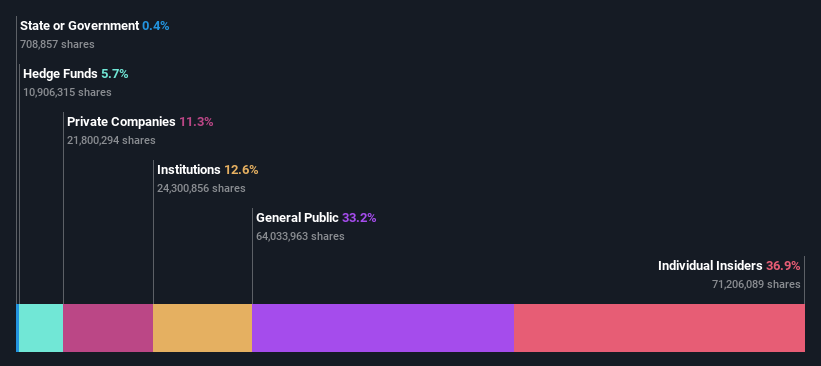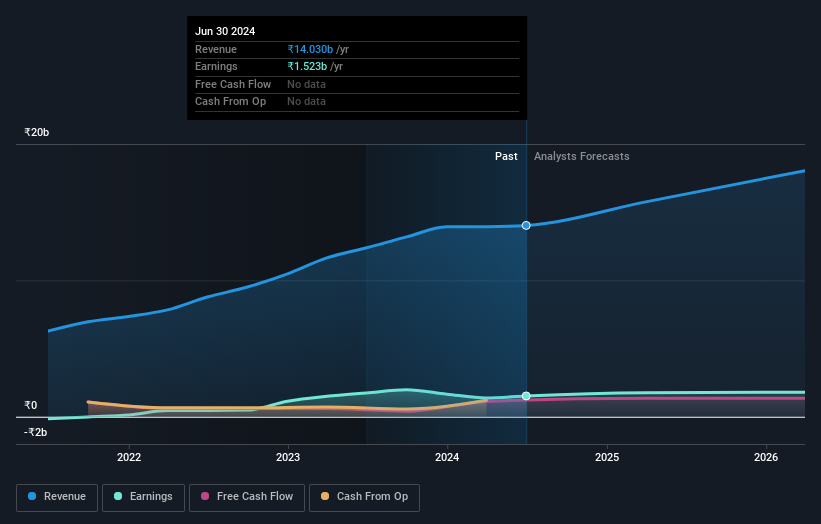Tilaknagar Industries Ltd. (NSE:TI) Senior Key Executive Shivani Dahanukar, the company's largest shareholder sees 11%reduction in holdings value
Key Insights
- Insiders appear to have a vested interest in Tilaknagar Industries' growth, as seen by their sizeable ownership
- 52% of the business is held by the top 6 shareholders
- Institutional ownership in Tilaknagar Industries is 13%
To get a sense of who is truly in control of Tilaknagar Industries Ltd. (NSE:TI), it is important to understand the ownership structure of the business. And the group that holds the biggest piece of the pie are individual insiders with 37% ownership. Put another way, the group faces the maximum upside potential (or downside risk).
As a result, insiders as a group endured the highest losses after market cap fell by ₹6.5b.
Let's delve deeper into each type of owner of Tilaknagar Industries, beginning with the chart below.
View our latest analysis for Tilaknagar Industries

What Does The Institutional Ownership Tell Us About Tilaknagar Industries?
Institutions typically measure themselves against a benchmark when reporting to their own investors, so they often become more enthusiastic about a stock once it's included in a major index. We would expect most companies to have some institutions on the register, especially if they are growing.
We can see that Tilaknagar Industries does have institutional investors; and they hold a good portion of the company's stock. This can indicate that the company has a certain degree of credibility in the investment community. However, it is best to be wary of relying on the supposed validation that comes with institutional investors. They too, get it wrong sometimes. It is not uncommon to see a big share price drop if two large institutional investors try to sell out of a stock at the same time. So it is worth checking the past earnings trajectory of Tilaknagar Industries, (below). Of course, keep in mind that there are other factors to consider, too.

It looks like hedge funds own 5.7% of Tilaknagar Industries shares. That worth noting, since hedge funds are often quite active investors, who may try to influence management. Many want to see value creation (and a higher share price) in the short term or medium term. Because actions speak louder than words, we consider it a good sign when insiders own a significant stake in a company. In Tilaknagar Industries' case, its Senior Key Executive, Shivani Dahanukar, is the largest shareholder, holding 17% of shares outstanding. Meanwhile, the second and third largest shareholders, hold 14% and 6.2%, of the shares outstanding, respectively. Interestingly, the second-largest shareholder, Amit Dahanukar is also Chief Executive Officer, again, pointing towards strong insider ownership amongst the company's top shareholders.
On further inspection, we found that more than half the company's shares are owned by the top 6 shareholders, suggesting that the interests of the larger shareholders are balanced out to an extent by the smaller ones.
While studying institutional ownership for a company can add value to your research, it is also a good practice to research analyst recommendations to get a deeper understand of a stock's expected performance. There is a little analyst coverage of the stock, but not much. So there is room for it to gain more coverage.
Insider Ownership Of Tilaknagar Industries
While the precise definition of an insider can be subjective, almost everyone considers board members to be insiders. Management ultimately answers to the board. However, it is not uncommon for managers to be executive board members, especially if they are a founder or the CEO.
Most consider insider ownership a positive because it can indicate the board is well aligned with other shareholders. However, on some occasions too much power is concentrated within this group.
Our information suggests that insiders maintain a significant holding in Tilaknagar Industries Ltd.. It has a market capitalization of just ₹53b, and insiders have ₹20b worth of shares in their own names. It is great to see insiders so invested in the business. It might be worth checking if those insiders have been buying recently.
General Public Ownership
The general public-- including retail investors -- own 33% stake in the company, and hence can't easily be ignored. This size of ownership, while considerable, may not be enough to change company policy if the decision is not in sync with other large shareholders.
Private Company Ownership
We can see that Private Companies own 11%, of the shares on issue. It's hard to draw any conclusions from this fact alone, so its worth looking into who owns those private companies. Sometimes insiders or other related parties have an interest in shares in a public company through a separate private company.
Next Steps:
I find it very interesting to look at who exactly owns a company. But to truly gain insight, we need to consider other information, too.
Many find it useful to take an in depth look at how a company has performed in the past. You can access this detailed graph of past earnings, revenue and cash flow.
Ultimately the future is most important. You can access this free report on analyst forecasts for the company.
NB: Figures in this article are calculated using data from the last twelve months, which refer to the 12-month period ending on the last date of the month the financial statement is dated. This may not be consistent with full year annual report figures.
Valuation is complex, but we're here to simplify it.
Discover if Tilaknagar Industries might be undervalued or overvalued with our detailed analysis, featuring fair value estimates, potential risks, dividends, insider trades, and its financial condition.
Access Free AnalysisHave feedback on this article? Concerned about the content? Get in touch with us directly. Alternatively, email editorial-team (at) simplywallst.com.
This article by Simply Wall St is general in nature. We provide commentary based on historical data and analyst forecasts only using an unbiased methodology and our articles are not intended to be financial advice. It does not constitute a recommendation to buy or sell any stock, and does not take account of your objectives, or your financial situation. We aim to bring you long-term focused analysis driven by fundamental data. Note that our analysis may not factor in the latest price-sensitive company announcements or qualitative material. Simply Wall St has no position in any stocks mentioned.
About NSEI:TI
Tilaknagar Industries
Engages in the manufacture and sale of Indian made foreign liquor and its related products in India.
Outstanding track record with flawless balance sheet.
Similar Companies
Market Insights
Community Narratives



